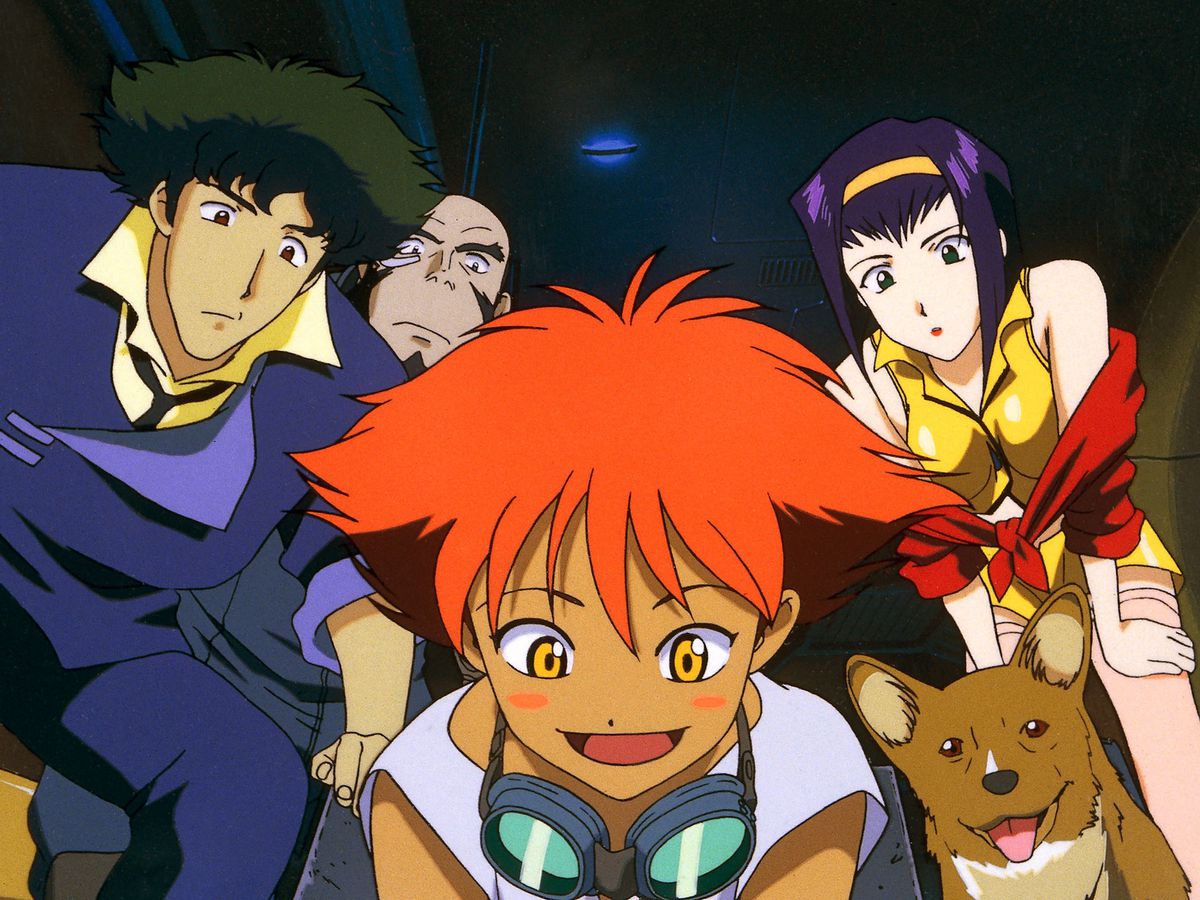Cowboy Bebop’s English voice cast has strong feelings about the movie
Cowboy Bebop: The Movie, known in Japan by the much better name Cowboy Bebop: Knockin’ On Heaven’s Door, was released in 2001 and takes place during the show’s final handful of episodes. Most anime movies don’t impact the overall arc of the show, featuring enemies, allies, and plot points that are rarely ever acknowledged outside the movie’s quarantine zone. However, Knockin’ On Heaven’s Door transcends the trope of the inconsequential anime movie and is critical to the conversation surrounding the show’s cultural impact.
In Knockin’ On Heaven’s Door, the gang are unwittingly sucked into a bio-terrorism plot, forced to stop the evil Vincent Volaju before he unleashes a deadly storm of nanobots on Mars. The movie hits on all the little things that make a typical Cowboy Bebop episode great. Every character gets a moment to let their unique talents save the day. There’s an absolutely bitchin’ spaceship battle underscored by Yoko Kanno’s soul-stealing soundtrack. And at the end, the bad guy is tragically relatable.

It’s the villain’s tragedy that makes Knockin’ On Heaven’s Door so crucial to Cowboy Bebop’s narrative. Every episode of Cowboy Bebop gives you the tiniest glimpse into what makes each character tick, and in the movie, that glimpse widens into a window through which we are allowed to see the characters as never before. For the English voice cast of the show, the movie contains some of their most memorable moments.
“I actually got emotional regarding Spike’s experience,” Beau Billingslea, voice actor for Jet Black, says of the movie in an interview with The Verge.
Steve Blum, voice of Spike Spiegel, agrees.
“I think the most profound moment for me was in the movie when he was talking to Electra about the pain that he was experiencing and his loss and damage.”
Blum’s referring to one of the movie’s quieter moments in which he’s stuck in a prison with Elektra Ovirowa — voiced by the Commander Shepard, Jennifer Hale. As Elektra shares her past romantic connection with Vincent, Spike shares a bit of his own history in the murderous Syndicate mob.
“When I was younger, I wasn’t afraid of anything,” Spike says to Elektra in the movie. “I didn’t have the slightest fear of dying. […] But then I met a certain woman and it changed. For the first time the idea of death began to scare me.”
[embedded content]
“It was the first time that he really got vulnerable,” Blum says, crediting that moment as the deepest and most open Spike ever is. This movie moment exposes in Spike a “vulnerability that he tried so hard to hide, or escape,” according to Blum.
Wendee Lee, the voice of Faye Valentine, also holds the movie in high regard. “We know all of these characters have damage,” Lee says. “We explore that systematically throughout the series. […] But they save Spike for the film. Much later. Think of the genius that’s in the beats of storytelling in the way Bebop delivers the story. I think that in itself is one of the greater appeals of the whole franchise.”
Cowboy Bebop the series was recorded separately and disjointedly, with the actors coming in solo to record their scenes, one by one. Though the camaraderie we hear in the banter of the crew was recorded in isolation, it was no less genuine — and genuine in the actors themselves.
“Steve left me a note in the script,” Billingslea recalls. “He said, ‘Hey Beau, Jet sucks.’ So I went forward in the script, and I said, ‘Hey Steve, Spike sucks, and the Bebop to my ship.’”
For the movie, the actors were brought into a big recording studio with the movie’s producers close at hand to offer opinions on actors’ performances. Despite that distraction, Blum says that recording the moment between Elektra and Spike was so emotional he “broke down.”
“And the moment was fairly brief compared to the exposition for a lot of the other characters,” Blum continues. “And yet [it was] so incredibly powerful, and then goes right back into the action shortly after, it was kind of amazing. It really taught me that a moment can change your life for the better for the worse. It changed me as an actor, changed me as a person. And I didn’t have that realization until many years later.”
Knockin’ On Heaven’s Door’s importance to Cowboy Bebop isn’t only because of profound character and actor moments, it’s also home to two of the best songs in the Bebop soundtrack canon and the actors agree.
“Gotta Knock A Little Harder” is one of Blum’s favorite songs (and mine, not gonna lie) as is “What Planet Is This.”
Cowboy Bebop is having a renaissance. Twenty-two years after the show’s release, Netflix is launching a live-action adaptation along with making the original anime available on its streaming platform (the anime is also available to stream on Funimation). But amid the surge of Cowboy Bebop news — the live-action show’s soundtrack will launch on Spotify the same day as the show — the movie seems to be missing from the conversation. It does not help that it can’t be streamed anywhere. It’s not available on either Netflix or Crunchyroll even though both services carry the show. (Curiously, though, you can stream it on Netflix in Canada — lucky Canadians.) The only reason I was able to rewatch the movie myself was because I still had a physical copy that I made my father buy from a Blockbuster the day it was released. Knockin’ On Heaven’s Door is just as embedded into the DNA of the live-action show as the anime itself, and when we talk about how great Cowboy Bebop is, it should be included.
https://www.theverge.com/2021/11/20/22792082/cowboy-bebop-english-voice-cast-interview